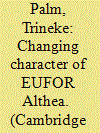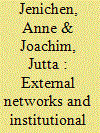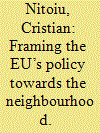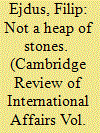|
|
|
Sort Order |
|
|
|
Items / Page
|
|
|
|
|
|
|
| Srl | Item |
| 1 |
ID:
155807


|
|
|
|
|
| Summary/Abstract |
States have different strategic cultures when it comes to legitimating the use of military force and its relation with other foreign policy instruments. However, increasingly, military operations are conducted in multilateral forums; EU military operations are one of the most notable examples of this development. While some claim that these operations reflect power relations between nations with different strategic cultures, others argue that these common missions involve states in a process of collective learning and convergence of interests. Drawing upon an advocacy coalition approach, this paper confronts the competing hypotheses in the case of European Union Force (EUFOR) Althea in Bosnia-Herzegovina (BiH), as the EU’s longest running military operation (since 2004). On the basis of policy documents and semi-structured interviews with policymakers and politicians, this paper concludes that the evolution of EUFOR Althea has been primarily the result of the power politics of different coalitions, but there have also been a few instances of learning.
|
|
|
|
|
|
|
|
|
|
|
|
|
|
|
|
| 2 |
ID:
155809


|
|
|
|
|
| Summary/Abstract |
In 2008, the Council of the European Union (EU) adopted a ‘Comprehensive Approach’ that outlines a strategy for securing gender mainstreaming; two years later, the Council introduced a set of indicators to assess its implementation. The EU was responding to the United Nations Security Council’s call for regional institutions to assist in implementing Security Council Resolution (UNSCR) 1325, adopted on 31 October 2000, concerning ‘women, peace and security’. This resolution sought to meet the ‘urgent need to mainstream a gender perspective into peacekeeping operations’. Considering that prior exposure to gender issues, resources and well-established relations with civil society and gender advocates are lacking, the adoption of both the Comprehensive Approach and the indicators, as well as the structures and procedures established since then as part of the EU’s Common Security and Defence Policy, requires some explanation. This article draws on feminist institutionalist approaches to argue that the impetus for change came from individuals and groups within the EU who were involved in external networks, both above and below the supranational level, who seized on institutional idiosyncrasies that also shaped the implementation of UNSCR 1325 in important ways.
|
|
|
|
|
|
|
|
|
|
|
|
|
|
|
|
| 3 |
ID:
155808


|
|
|
|
|
| Summary/Abstract |
The Lisbon treaty afforded the European Parliament (EP) increased powers in foreign policy. These have included new legislative competences in the area of international agreements or the European Union’s (EU) relations with third party states. This article analyses the way the last mandate of the EP, which was the first to benefit from the changes introduced by the Lisbon treaty, framed EU foreign policy. More specifically, it explores the way in which the EP strategically framed the EU’s approach towards the neighbourhood countries. The focus on the neighbourhood is justified by the fact that it is the most salient area of the EU’s foreign policy. The article shows that the EP pushed for the EU to have a stronger presence in the neighbourhood. The EP also strategically aimed that it should have a more central role in shaping the EU’s approach towards the neighbourhood.
|
|
|
|
|
|
|
|
|
|
|
|
|
|
|
|
| 4 |
ID:
155805


|
|
|
|
|
| Summary/Abstract |
Extant scholarship on ontological security in international relations has focused on the significance of social environments for state identity. In this article, I argue that material environments also provide an important source of ontological security for states. In order to assume this role material environments need to be discursively linked to state identity through either projection or introjection. Once incorporated into state identity narratives, material environments become ‘ontic spaces’: spatial extensions of the collective self that cause state identities to appear more firm and continuous. However, ontic spaces are inherently unstable and require maintenance, especially during periods of crisis or transition. States bear agency in this process but they never achieve full control, as identity discourses are continuously contested both domestically and internationally. I illustrate these claims by looking at the role of the General Staff Headquarters in Belgrade, destroyed by the North Atlantic Treaty Organization in 1999, in the ontological security of Serbia.
|
|
|
|
|
|
|
|
|
|
|
|
|
|
|
|
| 5 |
ID:
155806


|
|
|
|
|
| Summary/Abstract |
This study traces the (geopolitical) knowledge on terrorism circulating in Germany, India, Kenya, and the United States based on an analysis of school textbooks. It contributes to the existing literature in three ways. First, it transcends the Western-centrism of International Relations by analysing discourses from the Global North and the Global South. Second, it introduces school textbooks as a crucial object of research in constructivist terrorism studies and International Relations. School textbooks indicate the (geopolitical) knowledge deemed essential in a given society, but are also widely distributed among young people. Third, I address the debate about a presumed homogenization and internationalization of terrorism discourses in recent years. Results show that all four discourses depict terrorists as evil, focus on external non-state groups as perpetrators and associate terrorism with Islam. But there are also considerable differences regarding the relative importance of terrorism as a security threat, the referent object affected and the countermeasures deemed appropriate.
|
|
|
|
|
|
|
|
|
|
|
|
|
|
|
|
| 6 |
ID:
155804


|
|
|
|
|
| Summary/Abstract |
This article offers a critique of Alexander Anievas and Kerem Nişancioğlu’s How the West came to rule: the geopolitical origins of capitalism. We argue that while all historiography features a number of silences, shortcomings or omissions, the omissions in How the West came to rule lead to a mistaken view of the emergence of capitalism. There are two main issues to be confronted. First, we argue that Anievas and Nişancioğlu have an inadequate and misleading understanding of “capital” and “capitalism” that tilts them towards a theoretical stance that comes very close to arguing that everything caused capitalism while at the same time having no clear and convincing definition of “capital” or “capitalism”. Second, there are at least three omissions—particular to England/Britain within a geopolitical context—that should be discussed in any attempt to explain the development of capitalism: the financial revolution and the Bank of England; the transition to coal energy; and the capitalization of state power as it relates to war, colonialism and slavery. We conclude by calling for a connected-histories approach within the framework of capital as power.
|
|
|
|
|
|
|
|
|
|
|
|
|
|
|
|
|
|
|
|
|